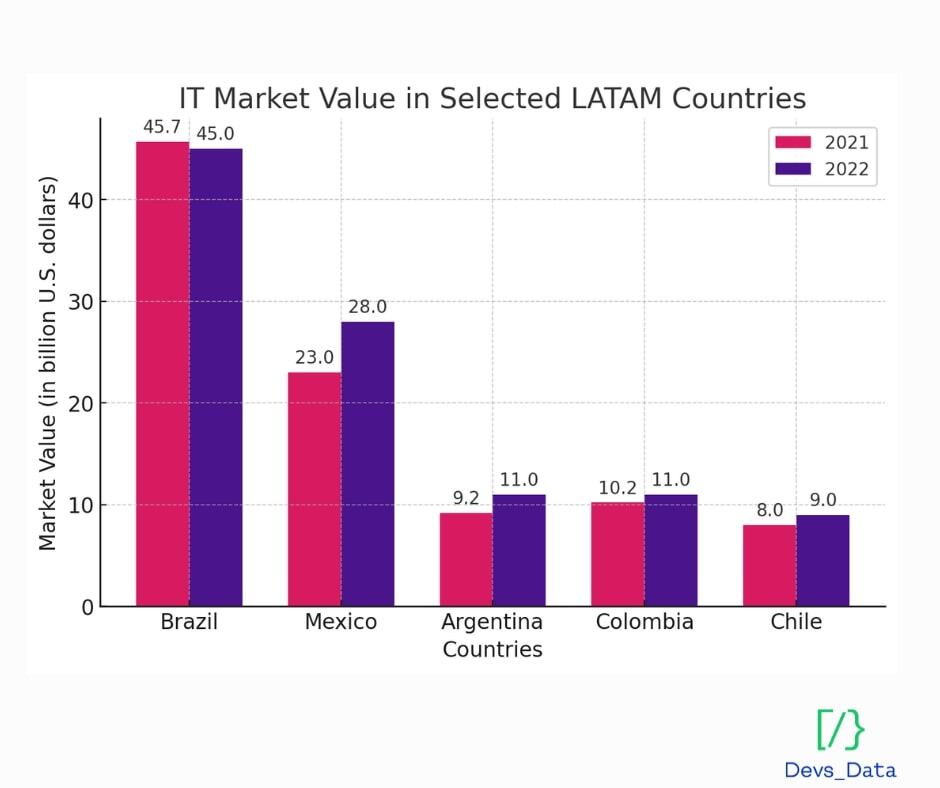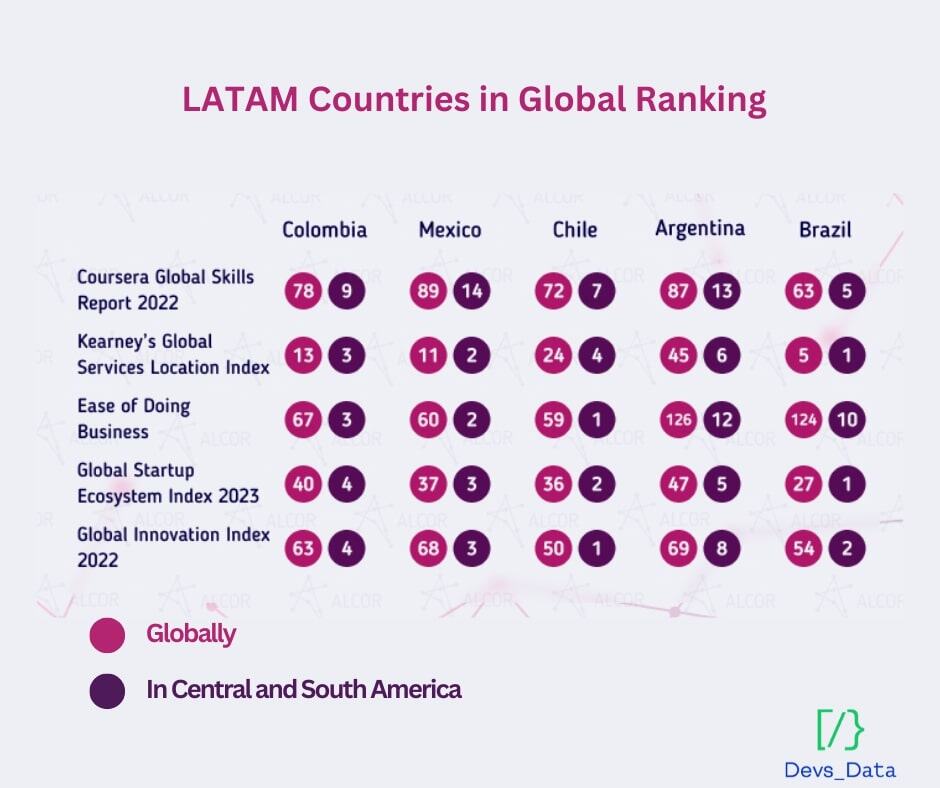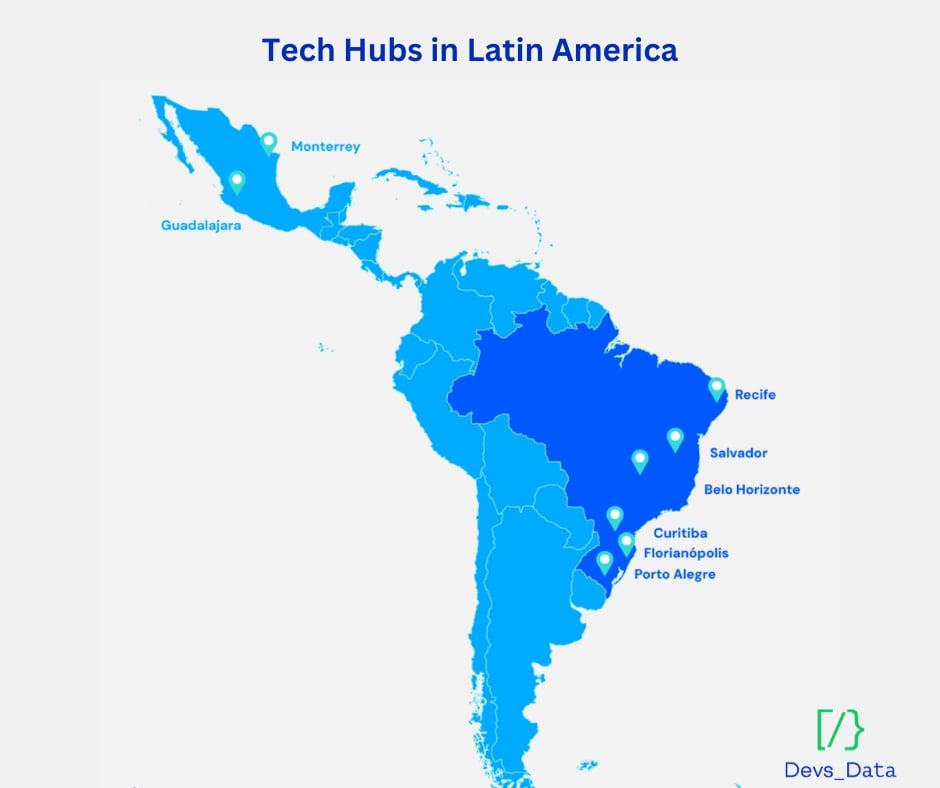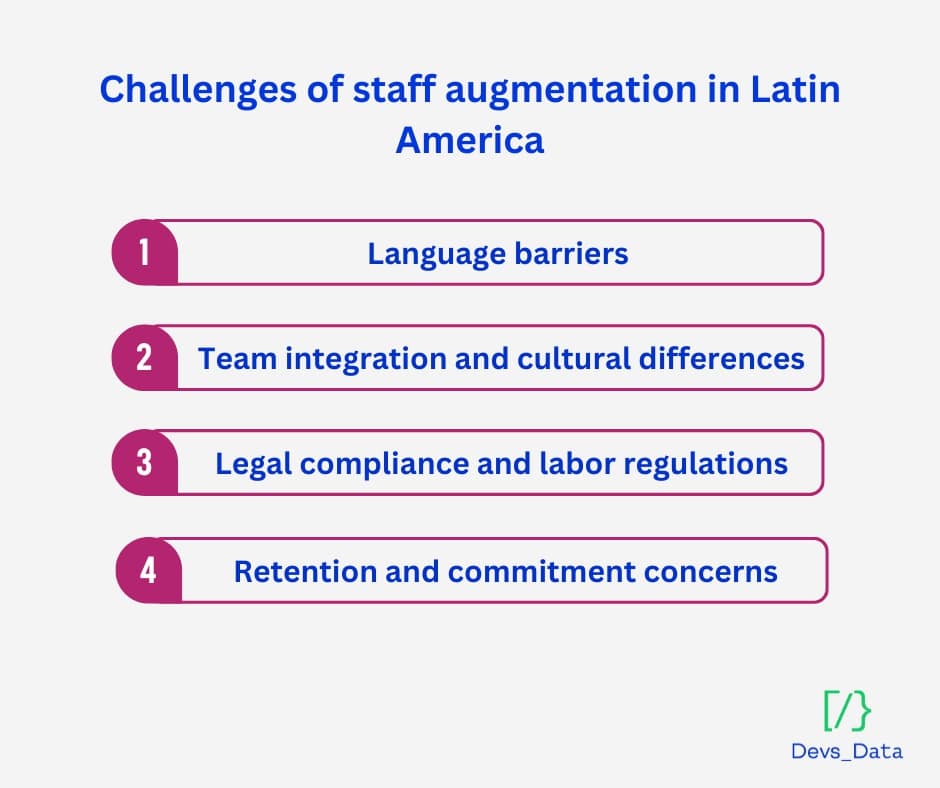


The global tech talent shortage is no secret—90% of business leaders struggle to recruit and retain top-tier professionals, particularly for highly skilled roles. As the demand for developers outpaces supply, more companies are turning to Latin America for staff augmentation solutions—and for good reason.
The region has emerged as a nearshoring powerhouse, thanks to its booming software industry, which generated $18.6 billion in 2022. Brazil alone is projected to add over $3 billion in market value by 2028. More importantly, Latin America produces an impressive 605000 new software engineers annually, far outpacing the 88000 graduates in the US.
Beyond sheer talent volume, cost efficiency, time zone alignment, and cultural similarities with North America, Latin America presents another significant advantage: e-migration. Unlike traditional outsourcing, e-migration enables skilled professionals to work remotely for global companies without relocating.
In 2023, over 2.2 million remote workers from Brazil, Argentina, and Mexico contributed to international projects while remaining in their home countries.
This evolving dynamic makes Latin America an even more attractive destination for businesses seeking scalable, high-quality development teams. But where should you hire? With Mexico, Colombia, Argentina, and Brazil leading the region’s tech scene, this article breaks down the top staff augmentation destinations and what makes them stand out.
Staff augmentation is a flexible hiring model that allows businesses to enhance their in-house teams by integrating external IT professionals, such as developers, designers, or engineers, on a temporary or project-specific basis. Unlike traditional outsourcing, where entire projects are handed over to third-party vendors, staff augmentation allows companies to maintain full control over their workflows while leveraging external expertise.
While both staff augmentation and outsourcing involve leveraging external expertise, they operate on fundamentally different models. To clarify these distinctions, we highlight four key differences that showcase how staff augmentation preserves internal control while integrating external expertise on a flexible basis:
How staff augmentation differs from outsourcing
| Feature | Staff Augmentation | Traditional outsourcing |
|---|---|---|
| Control over projects | Complete control over workflow, management, and processes. | Limited direct oversight; a third-party vendor handles projects. |
| Integration with the in-house team | Seamless collaboration with the company’s employees. | The external team works independently, often following its structure. |
| Flexibility | Scale workforce up or down based on demand. | Less flexibility; typically requires delegation of the entire project. |
| Cost structure | Pay for specific skills and work hours, avoiding full-time hiring expenses. | Fixed contract pricing, which can include management and overhead costs. |
These distinctions emphasize staff augmentation as a model that preserves control over workflows while providing the flexibility to access specialized skills without committing to long-term hiring.
Companies facing workforce shortages, tight deadlines, or specialized expertise needs can leverage staff augmentation to fill critical roles without long-term hiring commitments. Unlike traditional outsourcing, where entire projects are handled externally, staff augmentation integrates skilled professionals directly into existing teams, maintaining alignment with internal processes and project goals. However, incorporating external professionals can present security and intellectual property risks, making confidentiality agreements and NDAs essential.
Staff augmentation allows businesses to optimize costs by hiring skilled professionals as needed, avoiding full-time salaries, benefits, and office space expenses. In contrast to outsourcing, where pricing is typically fixed and includes vendor management fees, staff augmentation offers more granular cost control. Still, maintaining consistent quality when working with external talent requires clear guidelines and effective communication.
Recruiting top tech talent can take weeks or months, delaying project timelines. With staff augmentation, businesses gain on-demand access to experienced professionals, significantly reducing hiring time. Unlike outsourcing, which often involves negotiating project scopes and contracts, staff augmentation facilitates quicker integration of specialists who can immediately align with ongoing projects. However, ensuring smooth knowledge transfer when contracts end can prevent potential disruptions.
Easily adjust team size based on evolving project needs. Whether companies require a short-term boost for a high-priority project or a long-term extension of capabilities, staff augmentation provides the flexibility to adapt without the complexities of traditional hiring. Yet, aligning temporary workers with company culture and established workflows may require additional onboarding efforts.
Staff augmentation opens doors to highly skilled professionals in emerging tech hubs worldwide. Countries such as Mexico, Colombia, Argentina, and Brazil offer a wealth of IT talent, comprising well-trained, bilingual developers experienced in global projects. However, employing external workers across borders may involve complex legal and regulatory considerations, including tax obligations, labor laws, and data privacy regulations.
Do you have staff augmentation needs?
For many North American companies, nearshoring talent from Latin America provides access to a highly skilled workforce at a fraction of the cost compared to local hiring. This approach can reduce development expenses by 30% to 60% while maintaining high-quality output. The region offers strong IT talent pools, competitive salaries, and professionals who are culturally and linguistically aligned with North American markets, ensuring smoother collaboration.
Where it makes sense:
Staff augmentation is particularly effective in tech-driven industries where demand for specialized skills fluctuates. It’s commonly used in:
Latin America has become a go-to destination for staff augmentation, attracting North American companies with its cost-effective, highly skilled workforce and business-friendly environment. According to the World Bank, Latin America houses approximately 2 million software developers specializing in JavaScript, Python, Java, .NET, React, and cloud computing. The region offers a diverse talent pool that meets the evolving demands of global tech companies.
Governments across Latin America have made significant investments in STEM education, producing a steady stream of qualified developers.
20 universities in the region rank among the Best Global Universities, including the University of São Paulo, Monterrey Institute of Technology, and the University of Chile. This robust education pipeline ensures a continuous influx of top-tier tech talent.
The Latin American tech market is booming, with more than 1 million software developers across Mexico, Colombia, Brazil, Chile, and Argentina. The IT industry’s total value in the region reached $105 billion in 2022, with key players like Brazil ($45 billion), Mexico ($28 billion), and Argentina ($11 billion) leading the charge.
These professionals are widely available and bring deep expertise in AI, data science, blockchain, and software engineering, making them a valuable resource for companies in need of specialized talent.
The chart below presents the most recent publicly available country-level IT market value statistics in Latin America, based on reliable 2021–2022 data from Statista. While no newer per-country figures in USD have been released by major research firms such as IDC or Gartner, broader 2023–2024 insights suggest the region’s digital economy continues to grow steadily. Reports like Atlantico’s Latin America Digital Transformation Report 2024 highlight rising tech investment, e-commerce penetration, and digital adoption across the region, further underscoring the increasing strategic importance of LatAm’s IT landscape.

Despite slight fluctuations, Brazil remained the largest IT market in Latin America, maintaining $45 billion in 2022. Mexico saw the most notable growth, jumping from $23 billion to $28 billion, while Argentina, Colombia, and Chile each experienced moderate increases, reaching $11 billion, $11 billion, and $9 billion, respectively.
Latin America offers a major cost advantage for companies looking to expand their IT teams. Salaries for developers in the region can be up to 70% lower than in the US, making it an attractive alternative to hiring locally.
Annual Software Developer Salaries in LatAm (USD)
| Role | Colombia | Mexico | Chile | Argentina | Brazil |
|---|---|---|---|---|---|
| Junior Developer | $14000–$28000 | $11000–$23000 | $13000–$24000 | $12000–$24000 | $12000–$25000 |
| Mid-Level Developer | $28000–$40000 | $24000–$35000 | $26000–$38000 | $25000–$38000 | $25000–$39000 |
| Senior Developer | $40000–$65000 | $38000–$55000 | $40000–$60000 | $38000–$60000 | $40000–$62000 |
LatAm countries offer competitive salary ranges for software developers, with Colombia and Brazil generally commanding higher rates for senior roles, ranging from $40000 to $65000 USD annually. Mexico and Argentina provide more cost-effective options, with junior developers earning $11000–$24000 USD, while mid-level salaries range between $24000 and $38000 USD. Chile maintains a middle ground, offering consistent rates across all levels.
This salary structure highlighted the region’s strategic advantage in cost-effective talent acquisition, making it a prime destination for companies seeking to scale tech teams without compromising quality.
Unlike outsourcing to Eastern Europe or Asia, where time zone differences create communication barriers, Latin American developers work within 1-3 hours of North American business hours. This allows for real-time collaboration, smoother workflows, and easier integration with in-house teams.
For US West Coast companies, the time difference with Mexico, Argentina, and Brazil is just one hour, making it almost like having a development team next door.
Latin America shares strong cultural and business ties with North America. This means that developers in the region are not just technically proficient but also business-savvy and adaptable to Western work cultures.
Additionally, English proficiency is increasing, particularly in countries such as Argentina, Mexico, and Colombia, thereby minimizing language barriers.

Latin America is quickly gaining recognition as a global tech hub, with cities like São Paulo, Mexico City, and Buenos Aires emerging as innovation hotspots.The region ranks high in:
The combination of a thriving startup scene, government support, and a growing number of venture capital investments makes Latin America an ideal place for businesses looking to scale quickly and efficiently.
Latin America offers the perfect blend of talent, affordability, and accessibility for companies looking to expand their software development capabilities.
The region offers a unique combination of skilled talent, cost efficiency, and time zone compatibility, making it an attractive option for businesses aiming to scale their tech teams effectively.
Latin America has become a prime destination for staff augmentation, offering cost-effective, highly skilled tech talent and time zone compatibility with North America. Several countries stand out due to their large developer talent pools, strong government support, and thriving tech ecosystems. Below is a detailed analysis of the best staff augmentation destinations in the region.

Colombia has emerged as a leading hub for IT talent, boasting over 150000 skilled professionals and a robust pipeline of STEM graduates. Since 2010, more than 333000 IT professionals have entered the workforce. The Colombian government actively supports the IT sector with tax incentives and skills development programs.
Major cities like Bogotá, Medellín, Cali, Barranquilla, and Cartagena have evolved into hubs for technology and innovation, attracting multinational companies and fostering growth. Colombia’s proximity to the US makes it an attractive nearshore outsourcing option. It operates within a favorable time zone, just one hour behind the US East Coast and two hours ahead of the West Coast. Senior developers earn between $40000 and $65000 annually, making the country an affordable alternative to hiring locally.
The country excels in database development, mobile development, and data analytics, although English proficiency remains a challenge compared to other Latin American nations.
Mexico is dominant in Latin American IT outsourcing, with a vast talent pool of over 700000 developers. The country has established itself as a strategic partner for US businesses due to its strong economic ties and tech-focused cities.
Guadalajara and Monterrey serve as Mexico’s primary tech hubs. Guadalajara alone hosts more than 30 design centers, including the Intel Guadalajara Design Center (GDC), which specializes in integrated circuits and hardware validation, as well as those of Toshiba and IBM, both of which have significant design and development operations in the city. Additionally, the region is home to four major technology research centers, including the Center for Research and Assistance in Technology and Design of the State of Jalisco (CIATEJ) and the CINVESTAV Guadalajara Unit, both of which drive advancements in scientific research and innovation. Monterrey complements this with the Monterrey Digital Hub, an innovation incubator fostering collaboration between businesses, academics, and digital experts.
Government initiatives have played a key role in advancing Mexico’s IT industry. Investment in tech parks, digital hubs, and incubators has created a business-friendly environment. The time zone alignment is highly favorable, with only a one-hour difference from the West Coast and a two-hour difference from the East Coast.
Senior software engineers in Mexico earn between $38000 and $55000 annually. The country excels in mobile development, data analytics, and cloud solutions. While English proficiency is lower than in Argentina or Chile, many developers working with US companies are fluent.
Argentina is one of the top choices for staff augmentation due to its highly educated workforce and strong English proficiency, ranking 30th globally. The country’s IT sector is concentrated in Buenos Aires, Córdoba, Mendoza, and Rosario.
Government-backed programs, such as Argentina Programa and Argentina Emprende, support the tech industry, while legislation like Law 25922 (Promotion of the Software Industry Law) fosters innovation. The country’s time zone is ideal for collaboration, just one hour ahead of most US cities.
With around 115000 developers, Argentina offers talent at competitive salaries. Senior software developers earn between $38000 and $60000 per year. The country’s strength lies in AI, cloud computing, mobile development, and data analytics.
Argentina’s highly skilled developer base has contributed significantly to the success of globally recognized tech firms, including Mercado Libre and Globant.
Brazil has the most significant IT workforce in Latin America, with over 500000 software developers. It dominates the region’s technology market, accounting for 36.5% of Latin America’s IT industry.
The country is at the forefront of AI, IoT, cloud, and edge computing. Over $49.8 billion was invested in software, hardware, and services in 2023, reinforcing Brazil’s commitment to digital transformation.
São Paulo, Rio de Janeiro, and Porto Alegre are key IT hubs, hosting multinational corporations and tech startups. The government supports the tech industry through programs like the Lei do Bem (Law of Good), which incentivizes companies to invest in research and development.
Brazil’s extensive educational infrastructure includes leading universities such as the University of São Paulo (USP) and the Federal University of Rio de Janeiro (UFRJ), which focus on advanced fields such as artificial intelligence, data science, and machine learning.
Senior developers earn between $40000 and $62000 per year.
Although costs are slightly higher than in other Latin American countries, Brazil’s talent pool is deep, and the government provides access to cutting-edge expertise.
Chile’s IT sector has experienced significant growth, with over 61000 software engineers specializing in cloud computing, data analytics, and software development. The country has one of the strongest educational systems in Latin America, producing highly trained professionals.
Santiago, Valparaíso, and Concepción are leading tech hubs, attracting both startups and multinational companies. Chile ranks high in English proficiency (47th globally), making it a suitable choice for US companies seeking staff augmentation with minimal language barriers.
Chile’s ease of doing business is another advantage, driven by transparent regulatory frameworks, stable economic policies, and strong legal protections for foreign investors. The country consistently ranks first in Latin America for business-friendly regulations, creating a favorable environment for international partnerships and tech investment. Additionally, senior software developers earn between $40000 and $60000 per year, offering a balance of affordability and expertise for companies seeking top-tier talent.
Chile operates in a convenient time zone, with no difference from the US East Coast and only a three-hour gap from the West Coast.
Despite its relatively small population, Uruguay has steadily built a reputation as a high-quality tech talent source, often overlooked in favor of larger markets like Brazil and Mexico. Strong government investment in education and technology, exemplified by initiatives like Plan Ceibal, has fostered a tech-savvy workforce from an early age.
Uruguay’s IT talent is characterized by its depth of expertise and rigorous education system. Unlike regions where developers can enter the workforce through short boot camps, Uruguayan IT degrees require six years of study, producing professionals with advanced technical skills and practical experience.
The country’s stable economy, low corruption levels, and high quality of life further contribute to its appeal as a destination for outsourcing. Also, strong English proficiency and a close-knit tech community make establishing productive collaborations easier for international companies.
While developer salaries in Uruguay are somewhat higher than in neighboring Argentina and Brazil, the country’s focus on quality over quantity and its business-friendly environment make it a compelling yet under-the-radar option for companies seeking skilled tech talent in Latin America.
Do you have staff augmentation needs?
While staff augmentation in Latin America offers many benefits, companies may encounter challenges related to language barriers, team integration, legal compliance, and retention issues. Understanding these challenges and implementing proactive strategies can help businesses optimize their nearshore IT staffing experience.

Language proficiency is one of the most significant challenges of staff augmentation in Latin America. While English is widely taught, fluency varies across the region. According to the EF English Proficiency Index, Argentina, Chile, and Brazil have higher levels of English proficiency, while Colombia and Mexico rank lower.
Miscommunication due to limited English skills can result in delays, misunderstandings, and increased error rates. Developers who struggle with technical documentation or client instructions may require additional onboarding and communication support.
However, urban centers like Buenos Aires, Santiago, São Paulo, and Mexico City have more English-speaking developers, particularly among the educated middle class. Partnering with a recruitment agency rather than relying solely on staff augmentation firms can expand the talent pool, increasing the likelihood of finding developers with strong English proficiency.
How to overcome language barriers:
Bringing in external developers through staff augmentation means integrating professionals from different backgrounds and work cultures. Latin American work culture is generally collaborative, flexible, and relationship-driven, which differs from US and European companies’ structured, process-oriented cultures.
Cultural differences can mislead work styles, expectations, and productivity norms. Augmented staff may need additional time to adapt to company workflows and collaboration tools. Furthermore, since many augmented developers are contracted temporarily, they may lack a long-term commitment to the company’s vision and values.
Challenges of team integration:
How recruitment agencies facilitate team integration:
A recruitment agency can help smooth the integration process by:
Latin America has diverse labor laws, making compliance challenging when hiring augmented staff across multiple jurisdictions.
Each country has distinct regulations on employment contracts, taxes, benefits, and termination policies, which can lead to legal complexities.
For example, countries like Brazil and Argentina have strict employee protection laws, requiring businesses to navigate tax withholdings, social security contributions, and severance obligations. On the other hand, Mexico and Colombia offer more flexible contracting options; however, companies still need to ensure compliance with local labor laws.
Key legal challenges:
How recruitment agencies mitigate legal risks:
A specialized recruitment agency can significantly reduce compliance risks by:
One of the common drawbacks of staff augmentation is lower commitment levels compared to full-time employees. Since augmented developers are often assigned to multiple projects or clients, they may lack a deep sense of loyalty to your organization.
Once a project ends, these developers return to their outsourcing firm or seek new engagements, making long-term knowledge retention difficult. This can lead to disruptions in continuity, code ownership issues, and reduced long-term efficiency.
Additionally, top Latin American developers are in high demand, and turnover rates can be particularly high when companies fail to offer competitive compensation, career growth opportunities, or engaging work environments.
Challenges in retention:
How specialized agencies address retention challenges:
A recruitment agency specializing in staff augmentation can play a key role in minimizing retention risks by implementing targeted strategies:
Staff augmentation in Latin America presents numerous advantages; however, businesses must navigate language barriers, cultural differences, legal compliance, and retention concerns to maximize the benefits of their outsourcing efforts.
Companies that strategically plan their staff augmentation approach by prioritizing communication, integrating augmented staff effectively, ensuring legal compliance, and fostering engagement will experience smoother collaboration and higher productivity.
By selecting the right country, hiring through reputable agencies, and investing in team integration efforts, businesses can mitigate risks and unlock the full potential of Latin America’s growing tech workforce.

Team size: ~60 employees
Founded in: 2016
Headquarters: Brooklyn, NY, and Warsaw, Poland
DevsData LLC specializes in staff augmentation for IT and software development, providing companies with pre-vetted, highly skilled professionals from Latin America, the US, and Europe. The company actively sources talent from key Latin American regions such as Chile, Argentina, Brazil, Mexico, and Colombia, giving clients access to diverse, top-tier engineering expertise. With a talent pool of over 65000 pre-screened engineers, the company offers flexible hiring solutions that allow businesses to scale quickly and cost-effectively. Unlike traditional hiring, their rigorous selection process, which includes technical assessments, problem-solving tests, and communication evaluations, results in only 6% of top-performing candidates being placed in client teams.
One of DevsData LLC’s biggest advantages is its customized approach to staff augmentation, addressing common challenges in legal compliance, team integration, and retention. Whether a company needs short-term developers, long-term dedicated teams, or specialized experts for niche projects, DevsData LLC tailors every hiring solution to business objectives.
To mitigate legal risks, the company’s Employer of Record (EoR) services handle payroll, tax compliance, and employment contracts across Latin America, ensuring businesses remain compliant with varying labor regulations. This service also includes confidentiality agreements and data protection protocols, safeguarding intellectual property when integrating external developers.
Regarding team integration, DevsData LLC carefully screens candidates for cultural fit and communication skills, reducing friction and ensuring smoother collaboration with in-house teams. Additionally, they provide ongoing support and regular feedback loops, fostering stronger alignment with project goals.
Retention is another critical focus. DevsData LLC offers a flexible engagement model, including a success-based fee structure, meaning clients only pay once a candidate is successfully placed. They also provide a guarantee period: if the hired professional does not meet expectations or leaves the position, DevsData LLC will promptly provide a suitable replacement at no additional cost, minimizing disruption and knowledge loss.
With 100+ successful projects and a strong reputation on Clutch and GoodFirms, DevsData LLC has helped companies like Johnson & Johnson, ZIM, and high-growth startups build high-performing remote teams. Their expertise in nearshore staff augmentation, cost-effective engagement models, and deep market knowledge makes them the ideal partner for companies looking to access premium Latin American tech talent.
In addition to staffing, DevsData LLC brings strong expertise in software development, offering custom solutions, full-cycle development, and ongoing support. Their past success stories include helping a global fashion brand build a machine learning-driven tech team and assisting a pharmaceutical company in improving platform functionality through specialized recruitment and technical consulting.
Do you have staff augmentation needs?
For more information, contact DevsData LLC at general@devsdata.com or visit their website at www.devsdata.com.
Latin America has become a top destination for IT staff augmentation, offering a diverse talent pool, cost-effective solutions, and strategic advantages for businesses worldwide. The best country depends on your specific needs, whether it’s scaling operations, reducing costs, or accessing specialized expertise.
As the largest IT market in Latin America, Brazil offers an extensive developer pool with expertise in AI, cloud computing, and software engineering. Its world-class R&D centers and innovation hubs make it an attractive choice for companies looking to build or expand their tech teams at scale.
Colombia is one of the most cost-effective destinations for staff augmentation, boasting a rapidly growing tech industry, competitive salaries, and strong government-backed IT initiatives. Businesses looking for high-quality developers at a fraction of the cost compared to North America can benefit from its expanding tech ecosystem.
Argentina stands out for its strong English proficiency, making collaboration with North American and European companies smoother. The country has also developed expertise in AI, data science, and emerging technologies, providing skilled talent at competitive rates.
Mexico’s massive developer pool, established IT hubs, and strategic location make it an ideal choice for startups and companies seeking seamless nearshore collaboration. Similar time zones, cultural alignment, and competitive salaries further enhance its appeal.
With a strong education system, ease of business, and cloud computing expertise, Chile is a reliable choice for companies seeking highly skilled developers and an innovation-driven ecosystem. Its stable economy and tech-friendly regulations add to its attractiveness.
Although smaller, Uruguay has developed a well-trained developer base recognized for its reliability and technical expertise. It is a solid option for businesses seeking skilled professionals with strong work ethics and a focus on quality.
Latin America remains a prime destination for IT staff augmentation, offering a balance of cost, skill, and scalability with minimal logistical challenges. Whether companies require a large-scale tech team, affordable yet skilled developers, or highly specialized expertise, the region offers tailored solutions to meet diverse business needs.
As the global demand for skilled developers rises, Latin America has solidified its position as a premier destination for IT staff augmentation. With a booming software industry, over 1 million IT professionals, and government-backed investments in STEM education, the region offers a vast and highly qualified workforce that meets the needs of modern businesses. Companies seeking to scale efficiently, reduce costs, and maintain high-quality development find Latin America an ideal solution, thanks to its proximity, cultural alignment, and seamless integration of remote work.
When choosing the right country, businesses should consider their specific priorities—scaling at speed with Brazil, optimizing costs in Colombia, hiring English-proficient AI specialists in Argentina, or leveraging Mexico’s strong startup ecosystem and proximity to the US. With Chile’s business-friendly environment and Uruguay’s elite, high-reliability developers, the region offers diverse options for companies of all sizes. This flexibility makes Latin America an attractive alternative to traditional hiring markets, enabling businesses to access top-tier talent while staying competitive in an increasingly digital world.
DevsData LLC addresses key challenges in staff augmentation by offering tailored solutions that ensure cultural alignment, legal compliance, and retention. Their rigorous vetting process selects the top 6% of engineers, reducing turnover and knowledge loss risks. Additionally, their Employer of Record (EoR) services handle payroll, tax compliance, and legal requirements, allowing companies to integrate Latin American talent seamlessly.
With flexible hiring models for both short-term projects and long-term engagements, DevsData LLC helps businesses navigate the complexities of international hiring, providing reliable developers who align with business goals and project demands. This approach positions them as a trusted partner for IT staff augmentation in Latin America and beyond.
For more information, contact DevsData LLC at general@devsdata.com or visit their website at www.devsdata.com.
Frequently asked questions (FAQ)
DevsData – your premium technology partner
DevsData is a boutique tech recruitment and software agency. Develop your software project with veteran engineers or scale up an in-house tech team of developers with relevant industry experience.
Free consultation with a software expert
🎧 Schedule a meeting
FEATURED IN


DevsData LLC is truly exceptional – their backend developers are some of the best I’ve ever worked with.”
Nicholas Johnson
Mentor at YC, serial entrepreneur


 Build your project with our veteran developers
Build your project with our veteran developers
 Explore the benefits of technology recruitment and tailor-made software
Explore the benefits of technology recruitment and tailor-made software
 Learn how to source skilled and experienced software developers
Learn how to source skilled and experienced software developers




Categories: Big data, data analytics | Software and technology | IT recruitment blog | IT in Poland | Content hub (blog)
